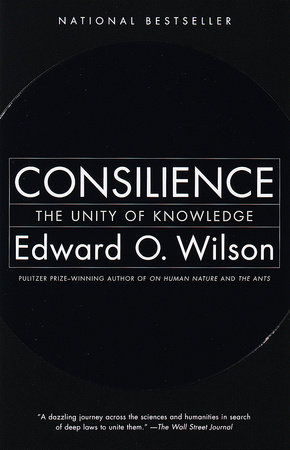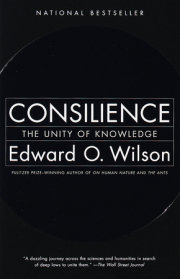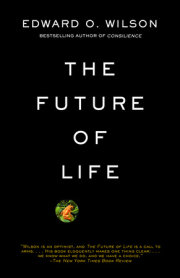The Ionian Enchantment
I remember very well the time I was captured by the dream of unified learning. It was in the early fall of 1947, when at eighteen I came up from Mobile to Tuscaloosa to enter my sophomore year at the University of Alabama. A beginning biologist, fired by adolescent enthusiasm but short on theory and vision, I had schooled myself in natural history with field guides carried in a satchel during solitary excursions into the woodlands and along the freshwater streams of my native state. I saw science, by which I meant (and in my heart I still mean) the study of ants, frogs, and snakes, as a wonderful way to stay outdoors.
My intellectual world was framed by Linnaeus, the eighteenth-century Swedish naturalist who invented modern biological classification. The Linnaean system is deceptively easy. You start by separating specimens of plants and animals into species. Then you sort species resembling one another into groups, the genera. Examples of such groups are all the crows and all the oaks. Next you label each species with a two-part Latinized name, such as
Corvus ossifragus for the fish crow, where
Corvus stands for the genus--all the species of crows--and
ossifragus for the fish crow in particular. Then on to higher classification, where similar genera are grouped into families, families into orders, and so on up to phyla and finally, at the very summit, the six kingdoms--plants, animals, fungi, protists, monerans, and archaea. It is like the army: men (plus women, nowadays) into squads, squads into platoons, platoons into companies, and in the final aggregate, the armed services headed by the joint chiefs of staff. It is, in other words, a conceptual world made for the mind of an eighteen-year-old.
I had reached the level of the Carolus Linnaeus of 1735 or, more accurately (since at that time I knew little of the Swedish master), the Roger Tory Peterson of 1934, when the great naturalist published the first edition of
A Field Guide to the Birds. My Linnaean period was nonetheless a good start for a scientific career. The first step to wisdom, as the Chinese say, is getting things by their right names.
Then I discovered evolution. Suddenly--that is not too strong a word--I saw the world in a wholly new way. This epiphany I owed to my mentor Ralph Chermock, an intense, chain-smoking young assistant professor newly arrived in the provinces with a Ph.D. in entomology from Cornell University. After listening to me natter for a while about my lofty goal of classifying all the ants of Alabama, he handed me a copy of Ernst Mayr's 1942
Systematics and the Origin of Species. Read it, he said, if you want to become a real biologist.
The thin volume in the plain blue cover was one of the New Synthesis works, uniting the nineteenth-century Darwinian theory of evolution and modern genetics. By giving a theoretical structure to natural history, it vastly expanded the Linnaean enterprise. A tumbler fell somewhere in my mind, and a door opened to a new world. I was enthralled, couldn't stop thinking about the implications evolution has for classification and for the rest of biology. And for philosophy. And for just about everything. Static pattern slid into fluid process. My thoughts, embryonically those of a modern biologist, traveled along a chain of causal events, from mutations that alter genes to evolution that multiplies species, to species that assemble into faunas and floras. Scale expanded, and turned continuous. By inwardly manipulating time and space, I found I could climb the steps in biological organization from microscopic particles in cells to the forests that clothe mountain slopes. A new enthusiasm surged through me. The animals and plants I loved so dearly reentered the stage as lead players in a grand drama. Natural history was validated as a real science.
I had experienced the Ionian Enchantment. That recently coined expression I borrow from the physicist and historian Gerald Holton. It means a belief in the unity of the sciences--a conviction, far deeper than a mere working proposition, that the world is orderly and can be explained by a small number of natural laws. Its roots go back to Thales of Miletus, in Ionia, in the sixth century b.c. The legendary philosopher was considered by Aristotle two centuries later to be the founder of the physical sciences. He is of course remembered more concretely for his belief that all matter consists ultimately of water. Although the notion is often cited as an example of how far astray early Greek speculation could wander, its real significance is the metaphysics it expressed about the material basis of the world and the unity of nature.
The Enchantment, growing steadily more sophisticated, has dominated scientific thought ever since. In modern physics its focus has been the unification of all the forces of nature--electroweak, strong, and gravitation--the hoped-for consolidation of theory so tight as to turn the science into a "perfect" system of thought, which by sheer weight of evidence and logic is made resistant to revision. But the spell of the Enchantment extends to other fields of science as well, and in the minds of a few it reaches beyond into the social sciences, and still further, as I will explain later, to touch the humanities. The idea of the unity of science is not idle. It has been tested in acid baths of experiment and logic and enjoyed repeated vindication. It has suffered no decisive defeats. At least not yet, even though at its center, by the very nature of the scientific method, it must be thought always vulnerable. On this weakness I will also expand in due course.
Einstein, the architect of grand unification in physics, was Ionian to the core. That vision was perhaps his greatest strength. In an early letter to his friend Marcel Grossmann he said, "It is a wonderful feeling to recognize the unity of a complex of phenomena that to direct observation appear to be quite separate things." He was referring to his successful alignment of the microscopic physics of capillaries with the macroscopic, universe-wide physics of gravity. In later life he aimed to weld everything else into a single parsimonious system, space with time and motion, gravity with electromagnetism and cosmology. He approached but never captured that grail. All scientists, Einstein not excepted, are children of Tantalus, frustrated by the failure to grasp that which seems within reach. They are typified by those thermodynamicists who for decades have drawn ever closer to the temperature of absolute zero, when atoms cease all motion. In 1995, pushing down to within a few billionths of a degree above absolute zero, they created a Bose-Einstein condensate, a fundamental form of matter beyond the familiar gases, liquids, and solids, in which many atoms act as a single atom in one quantum
state. As temperature drops and pressure is increased, a gas condenses into a liquid, then a solid; then appears the Bose-Einstein condensate. But absolute, entirely absolute zero, a temperature that exists in imagination, has still not been attained.
On a far more modest scale, I found it a wonderful feeling not just to taste the unification metaphysics but also to be released from the confinement of fundamentalist religion. I had been raised a Southern Baptist, laid backward under the water on the sturdy arm of a pastor, been born again. I knew the healing power of redemption. Faith, hope, and charity were in my bones, and with millions of others I knew that my savior Jesus Christ would grant me eternal life. More pious than the average teenager, I read the Bible cover to cover, twice. But now at college, steroid-driven into moods of adolescent rebellion, I chose to doubt. I found it hard to accept that our deepest beliefs were set in stone by agricultural societies of the eastern Mediterranean more than two thousand years ago. I suffered cognitive dissonance between the cheerfully reported genocidal wars of these people and Christian civilization in 1940s Alabama. It seemed to me that the Book of Revelation might be black magic hallucinated by an ancient primitive. And I thought, surely a loving personal God, if He is paying attention, will not abandon those who reject the literal interpretation of the biblical cosmology. It is only fair to award points for intellectual courage. Better damned with Plato and Bacon, Shelley said, than go to heaven with Paley and Malthus. But most of all, Baptist theology made no provision for evolution. The biblical authors had missed the most important revelation of all! Could it be that they were not really privy to the thoughts of God? Might the pastors of my childhood, good and loving men though they were, be mistaken? It was all too much, and freedom was ever so sweet. I drifted away from the church, not definitively agnostic or atheistic, just Baptist no more.
Still, I had no desire to purge religious feelings. They were bred in me; they suffused the wellsprings of my creative life. I also retained a small measure of common sense. To wit, people must belong to a tribe; they yearn to have a purpose larger than themselves. We are obliged by the deepest drives of the human spirit to make ourselves more than animated dust, and we must have a story to tell about where we came from, and why we are here. Could Holy Writ be just the first literate attempt to explain the universe and make ourselves significant within it? Perhaps science is a continuation on new and better-tested ground to attain the same end. If so, then in that sense science is religion liberated and writ large.
Such, I believe, is the source of the Ionian Enchantment: Preferring a search for objective reality over revelation is another way of satisfying religious hunger. It is an endeavor almost as old as civilization and intertwined with traditional religion, but it follows a very different course--a stoic's creed, an acquired taste, a guidebook to adventure plotted across rough terrain. It aims to save the spirit, not by surrender but by liberation of the human mind. Its central tenet, as Einstein knew, is the unification of knowledge. When we have unified enough certain knowledge, we will understand who we are and why we are here.
If those committed to the quest fail, they will be forgiven. When lost, they will find another way. The moral imperative of humanism is the endeavor alone, whether successful or not, provided the effort is honorable and failure memorable. The ancient Greeks expressed the idea in a myth of vaulting ambition. Daedalus escapes from Crete with his son Icarus on wings he has fashioned from feathers and wax. Ignoring the warnings of his father, Icarus flies toward the sun, whereupon his wings come apart and he falls into the sea. That is the end of Icarus in the myth. But we are left to wonder: Was he just a foolish boy? Did he pay the price for hubris, for pride in sight of the gods? I like to think that on the contrary his daring represents a saving human grace. And so the great astrophysicist Subrahmanyan Chandrasekhar could pay tribute to the spirit of his mentor, Sir Arthur Eddington, by saying: Let us see how high we can fly before the sun melts the wax in our wings.
Copyright © 1998 by Edward O. Wilson. All rights reserved. No part of this excerpt may be reproduced or reprinted without permission in writing from the publisher.











